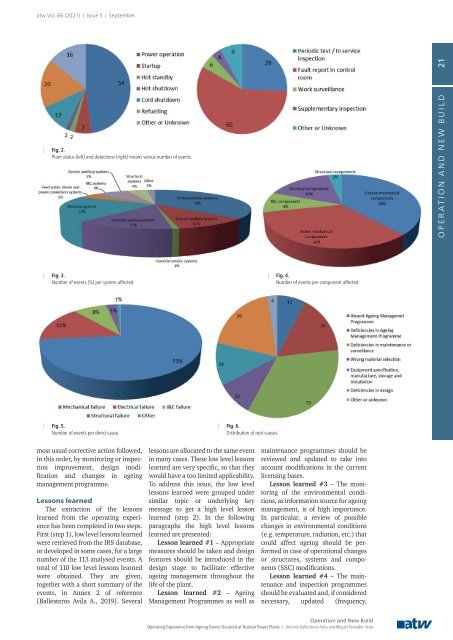atw - International Journal for Nuclear Power | 05.2021
Description Ever since its first issue in 1956, the atw – International Journal for Nuclear Power has been a publisher of specialist articles, background reports, interviews and news about developments and trends from all important sectors of nuclear energy, nuclear technology and the energy industry. Internationally current and competent, the professional journal atw is a valuable source of information. www.nucmag.com
Description
Ever since its first issue in 1956, the atw – International Journal for Nuclear Power has been a publisher of specialist articles, background reports, interviews and news about developments and trends from all important sectors of nuclear energy, nuclear technology and the energy industry. Internationally current and competent, the professional journal atw is a valuable source of information.
www.nucmag.com
Create successful ePaper yourself
Turn your PDF publications into a flip-book with our unique Google optimized e-Paper software.
<strong>atw</strong> Vol. 66 (2021) | Issue 5 ı September<br />
| Fig. 2.<br />
Plant status (left) and detections (right) means versus number of events.<br />
OPERATION AND NEW BUILD 21<br />
| Fig. 3.<br />
Number of events (%) per system affected.<br />
| Fig. 4.<br />
Number of events per component affected.<br />
| Fig. 5.<br />
Number of events per direct cause.<br />
| Fig. 6.<br />
Distribution of root causes.<br />
most usual corrective action followed,<br />
in this order, by monitoring or inspection<br />
improvement, design modification<br />
and changes in ageing<br />
management programme.<br />
Lessons learned<br />
The extraction of the lessons<br />
learned from the operating experience<br />
has been completed in two steps.<br />
First (step 1), low level lessons learned<br />
were retrieved from the IRS database,<br />
or developed in some cases, <strong>for</strong> a large<br />
number of the 113 analysed events. A<br />
total of 110 low level lessons learned<br />
were obtained. They are given,<br />
together with a short summary of the<br />
events, in Annex 2 of reference<br />
[ Ballesteros Avila A., 2019]. Several<br />
lessons are allocated to the same event<br />
in many cases. These low level lessons<br />
learned are very specific, so that they<br />
would have a too limited applicability.<br />
To address this issue, the low level<br />
lessons learned were grouped under<br />
similar topic or underlying key<br />
message to get a high level lesson<br />
learned (step 2). In the following<br />
paragraphs the high level lessons<br />
learned are presented:<br />
Lesson learned #1 – Appropriate<br />
measures should be taken and design<br />
features should be introduced in the<br />
design stage to facilitate effective<br />
ageing management throughout the<br />
life of the plant.<br />
Lesson learned #2 – Ageing<br />
Management Programmes as well as<br />
maintenance programmes should be<br />
reviewed and updated to take into<br />
account modifications in the current<br />
licensing bases.<br />
Lesson learned #3 – The monitoring<br />
of the environmental conditions,<br />
as in<strong>for</strong>mation source <strong>for</strong> ageing<br />
management, is of high importance.<br />
In particular, a review of possible<br />
changes in environmental conditions<br />
(e.g. temperature, radiation, etc.) that<br />
could affect ageing should be per<strong>for</strong>med<br />
in case of operational changes<br />
or structures, systems and components<br />
(SSC) modifications.<br />
Lesson learned #4 – The maintenance<br />
and inspection programmes<br />
should be evaluated and, if considered<br />
necessary, updated (frequency,<br />
Operation and New Build<br />
Operating Experience from Ageing Events Occurred at <strong>Nuclear</strong> <strong>Power</strong> Plants ı Antonio Ballesteros Avila and Miguel Peinador Veira

















